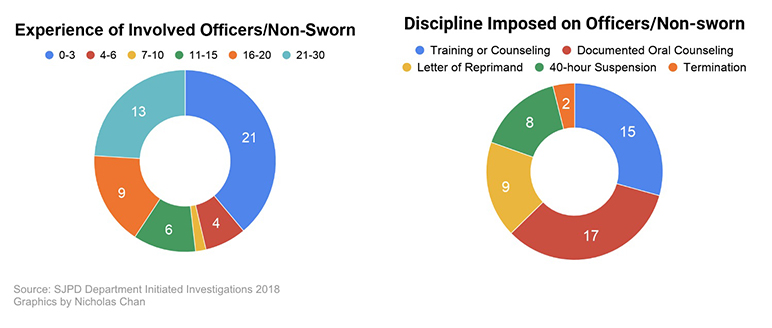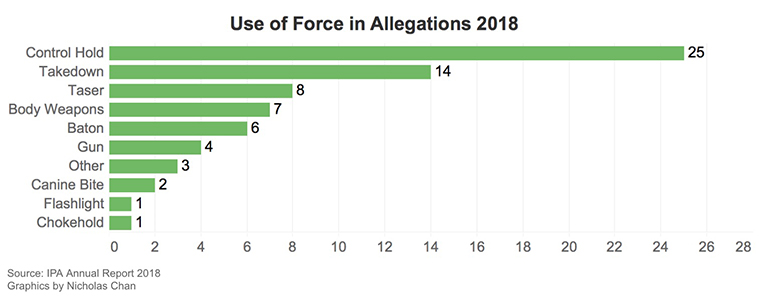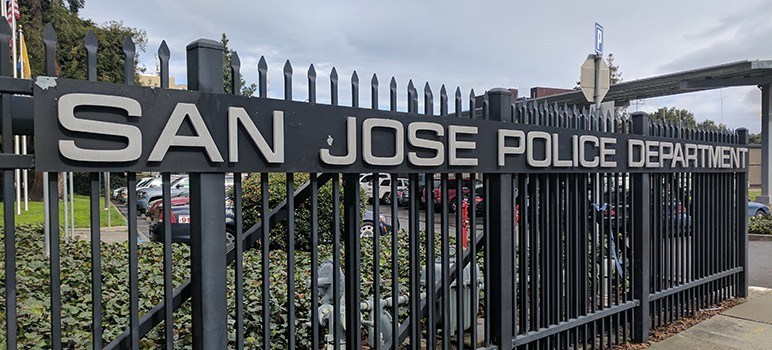The annual report from San Jose’s civilian cop watchdog made less of a splash this year, but that doesn’t mean it gave police a pass.
Continuing in the tradition of her predecessors, Independent Police Auditor (IPA) Shivaun Nurre issued recommendations to bolster transparency about incidents that prompt complaints of officer wrongdoing in the first place. She also wants to track when police point guns at people as a use of force, which she says would give the public a more complete picture of how officers conduct themselves in the field.
Nurre also disagreed with 10 investigations from the San Jose Police Department’s Internal Affairs Unit, according to the year-end review her office presented to the City Council earlier this week. In each of those cases, her office deemed SJPD’s decisions as less than thorough and fair.
Though she raised her concerns to the department’s top brass, Nurre says she wasn’t satisfied with their responses.
“Some of these there was back and forth with the lieutenant, and some of it I took it up to the chief, and a few of them went up to the city manager,” she says. “When they provided a re-analysis, I still found that they did not address my concerns sufficiently.”
Police Chief Eddie Garcia, however, says he took Nurre’s feedback into serious consideration. “We have disagreed, but I have also changed my mind and changed the course of an investigation based on her appeal to me,” he says.
It’s unclear to what effect, however. The police department doesn’t publicly report the number of times it changed case dispositions because of IPA disagreements.
Overall, the IPA saw an uptick in the number of complaints from 222 in 2017 to 248 last year. Some 39 percent of civilian-initiated cases came from people who filed multiple complaints—marking the first time IPA has tracked this statistic.
In all, 267 SJPD police officers were named in conduct complaints, or 24 percent of the overall force. Thirty-eight percent of officers who were found to have engaged in misconduct had at least 16 years of experience.

Meanwhile, the number of force complaints rose from 33 in 2017 to 46 in 2018. The use of control holds continue to account for the largest percentage of alleged physical force used. The last year also saw an uptick in Taser-related complaints, from five incidents in 2017 to eight the following year. And in 2018, there were five complaints about officer-involved shootings, a decrease from eight in 2017.
The IPA report was published concurrently with the police department’s overview of internally initiated investigations—those are inquiries into sworn and non-sworn staff that the IPA lacks the authority to audit.

The police investigated 121 internally filed allegations against sworn officers and it found that officers had engaged in misconduct in 88 of those instances (it should be noted that the number of allegations may exceed the number of complaints since a complaint can contain multiple allegations).
The police department investigated 35 allegations against non-sworn members, and found the subject employees had engaged in misconduct a combined 30 times.
The most common allegations were against members who didn’t follow department or city policies and conduct unbecoming an officer (known in acronymic police parlance as CUBO). The police department also disciplined the most officers since 2014, disciplining 37 sworn officers and five non-sworn officers.
On a number of key points, SJPD and the IPA see pretty much eye to eye.
For one thing, the police department says it agrees with Nurre’s recommendation to track incidents when officers point guns at people. “It’ll be a good opportunity to study whether or not the officers are pointing their firearms appropriately,” says Lt. Brian Matchett, who oversees SJPD’s Internal Affairs Unit.
Granted, that comes with a caveat.
Chief Garcia says he doesn’t think gun-pointing should be categorized as a reportable use of force, per se. “Having an office who, at the time, felt the need to protect themselves in the course of duty—to then be second guessed and asked by supervisor who may not be at the scene is something I am not prepared to sign off on,” he explained at Tuesday’s City Council hearing on the annual reports..
The council agreed. Though it passed a motion for the police department to document gun-pointing by officers, such incidents will only be categorized as reportable use-of-force incidents under certain heretofore unspecified criteria. What that criteria will be, exactly, will apparently be a matter of future debate.
Nurre’s office also suggests that police record all interviews and interrogations with kids. “There’s currently not a duty manual section that says officers need to do this,” she says. “We really think all interviews and interrogations should be recorded at a minimum.”
The directive comes after the IPA reportedly reviewed complaints about times when officers questioned students on campus without any visual record. The complaints criticized SJPD’s Internal Affairs Unit for relying on the memories and credibility of the officers, complainants and witnesses instead of on objective video evidence.
On that point, the police department also concurs with Nurre.
“It's only beneficial to the department and the person accused that that statement is recorded,” Matchett says. “It eliminates any question about the conduct of the officer or what was said at the time when the person is presenting the story.”
The police union, which mounted a full-throated take-down of Nurre’s predecessor—Aaron Zisser, who bowed out late last year after enduring a months-long campaign to oust him—comes off as more copacetic to this latest annual round-up of IPA findings. Even though San Jose Police Officers’ Association disagreed with some of Nurre’s conclusions and advice, union president Sgt. Paul Kelly says it’s nothing personal.
“The disagreements have been based upon substance and not personality," Kelly said in a prepared statement. “The information contained in this year's report is presented in a fact-based manner that is void of subjective opinions, slanted language and cherry-picked percentages that last year's report contained.”
And notably—unlike last year when community groups were floating the idea of expanding IPA authority—it comes at a time when there’s no real threat of landing that kind of police accountability measure on the ballot.


“Chief Garcia says he doesn’t think gun-pointing should be categorized as a reportable use of force, per se,”
WHAT? I call BS.
After watching police officers police themselves and crooked DA Jeff Rosen let every cop off known to man. Looks like citizens are taking things into their own hands and shining the transparency on local government and cops where it belongs. Film everything people ! It is the only defense. Jeff Rosen would like to have a monopoly on investigating police misconduct. He forgot we all have cameras now and people actually have a different view than Mr. Rosen when they see what is really going on! I know because I am actually asking local residents instead of waiting for Jeff Rosen or Eddie Garcia to do a press release and spin it to protect their careers. Mr. Rosen, you are on borrowed time. You have protected cops who killed, harmed and abused our most vulnerable citizens. Don’t think folks are drinking your KoolAId or TEDx Talks anymore. https://www.youtube.com/watch?v=6lM7EdfEj4o&t=363s- The Los Gatos and Gilroy chapters of Las Madres are about to have a little more to say about how well Jeff Rosen and Eddie Garcia have been doing their job.
San Jose has not had a good Police Chief since Joseph D. McNamara 1976-1991.
True dat!
They were under Federal oversight through a consent decree at the time.
Chris Rock’sYouTube “How to avoid getting your a** kicked by the police” should be shown to all students from middle school and high school twice a year, nationwide.
A true Irish cop, he’d have DRUNK to that!
Sorry, didn’t have much respect for a man that had little respect for the public, and I still don’t
Susan, fon’t Go get to tell ROSEN had protected cop who abuse and terrorised their own families. ROSEN HAS TO GO!